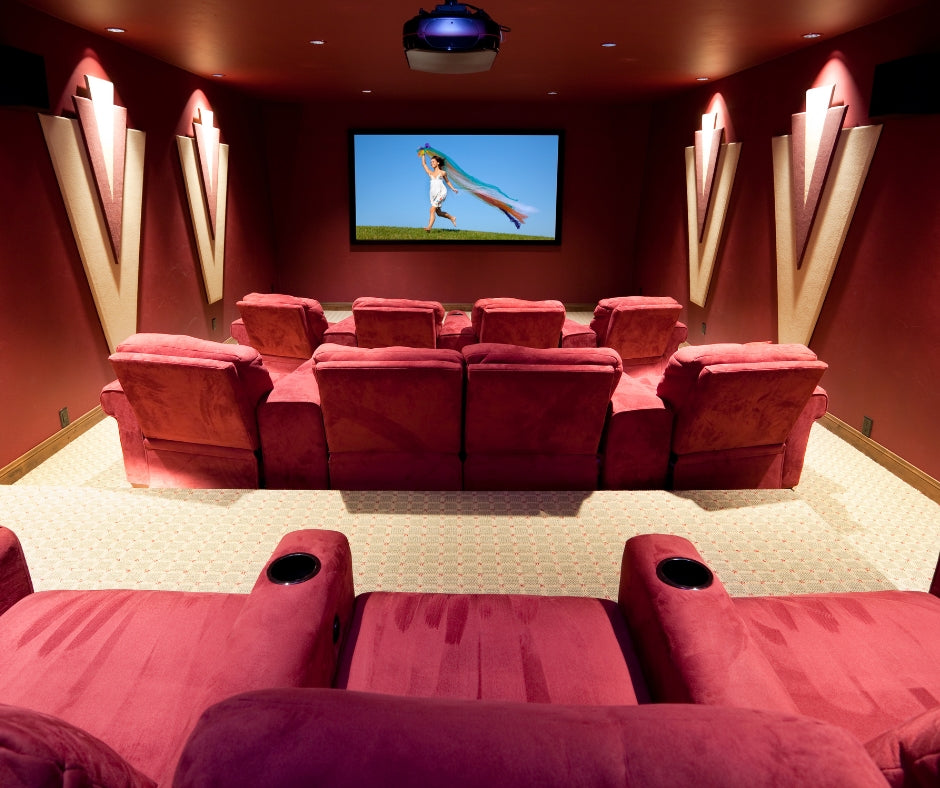
The CAVES Guide to Creating the Ultimate Home Theater Experience: Sound, Seating, Lighting and More
Ron StotzShare
Welcome to the world of home theaters! Whether you're a seasoned techie or a complete novice, setting up a home theater can be a fun and rewarding experience. In this article, we'll provide you with an overview of some key considerations for setting up a successful home theater. We won't get into the nitty-gritty of every piece of equipment and technology you'll need, but we will give you the basics to get started.
When it comes to setting up a home theater, the most important thing to consider is the room. Your home theater doesn't necessarily need to be a dedicated room, but it should be a space that's set apart from your everyday living area. This could be a spare bedroom, an attic, or even your family room if it has an open floor plan. You'll also want to consider factors like size, lighting, and acoustics. These will impact not only the overall functionality of your home theater but also the visual and audio experiences you'll have while using it.
Each of these rooms make suitable and enjoyable home theaters.
Once you've chosen a room, it's time to begin the planning and design phase. This involves considering your budget, as well as the types of technology you'd like to incorporate. A screen is a key component, as well as audio equipment, seating, and lighting. There are many different options to consider for each of these components, so it's important to take your time and research the different options available to you.
As you begin to plan, keep in mind that your home theater is a long-term investment. It's worth taking the time to make sure that you're making the right decisions the first time around. With the right preparation and planning, you'll be able to create a home theater that you and your family can enjoy for years to come.
Planning & Design
Planning and design are critical steps in setting up a successful home theater, and they should not be taken lightly. Before you start buying equipment and installing it, it's important to take the time to plan out your space and determine exactly what you want to achieve. This includes considering factors such as room size, lighting, and acoustics.
Room Size
One of the first considerations is the size of the room that you plan to use as your home theater. This could be a dedicated home theater room, or it could be a flexible space that you use for multiple purposes. Either way, it's important to consider the amount of space you have to work with. If you're planning to install a 100-inch screen, for example, you'll need a room that can accommodate it.
Acoustics
Acoustics are also an important consideration when it comes to setting up a home theater. The room should be designed to minimize reflections and ensure that the sound is clear and balanced throughout the space. You may want to consider adding acoustic treatment like sound-absorbing panels or rugs to the room to improve the acoustics.
One of our partner brands, Acoustic Innovations, offers stylish and functional wall treatments for optimal sound in home theater spaces.
Audio Equipment
When setting up a home theater, the audio is one of the most important features to get right. Without high quality audio, it's difficult to fully immerse yourself in the movie-viewing experience. There are a variety of different audio equipment options available on the market, and choosing the right ones can be a bit overwhelming. Here's a brief overview of the different types you may want to consider:
* Speakers: There are a variety of different speaker types available ranging from floorstanding, to in-wall, to in-ceiling speakers. If you're looking to really immerse yourself in the movie-viewing experience, you may consider adding surround sound speakers for a true cinematic experience.
* Subwoofer: The subwoofer is the component that provides the bass sounds in your audio system. This will add another dimension to your movie-viewing experience, and it's definitely worth considering if you're a movie lover.
* Receiver: The receiver is the central hub of your audio system, and it will also work as an amplifier. Many receivers these days come with advanced features like Dolby Atmos support, which can really enhance your audio experience.
Seating
Another important consideration when setting up a home theater is choosing the right seating. You want to ensure that your guests are comfortable and that they can easily view the screen. There are a variety of different seating options available, and the one that you choose will depend on the space you have available and your personal preference. Some popular seating options for a home theater include:
* Theater-style seats: These seats are designed to create a more immersive experience, and they're perfect for movie lovers who want to feel like they're in a real cinema. They come in a variety of different configurations, and some even have a built-in reclining feature for maximum comfort.
* Leather seats: Leather seats are a popular option for those who want a more elegant and luxurious feel to their home theater. They're also very durable and easy to clean, making them a great choice for families with young children.
* Couches: Seats like couches are a great option for those who want to create a comfortable and relaxing environment in their home theater. They're perfect for casual movie nights or TV watching, and their spacious seating areas can accommodate multiple guests.

Home theater seating can be as complex or simple as you'd like.
Lighting
Lighting is an essential component of a successful home theater, and it can really enhance the viewing experience. There are a variety of different lighting options available, and you'll want to choose the one that's right for your space. Some popular lighting options for a home theater include:
* Ambience lighting: Ambience lighting involves using soft, indirect lighting to create a warm and inviting atmosphere. This can include things like string lights, table lamps, and floor lamps.
* Projector lighting: If you're using a projector for your home theater, you'll need to consider how to light the screen appropriately. Projector lights are available that will provide the optimal amount of light for the screen, making sure that your movie-viewing experience is optimal.
Projectors
The projector is the centerpiece of your home theater setup, providing the visual entertainment that is the main draw of the space. There are many projector options available on the market today, each with its own unique features and capabilities.
* Resolution: The first thing you'll want to consider when selecting a projector is its resolution. Higher resolutions will produce sharper images, making them ideal for HD or 4K content.
* Brightness: You'll also want to consider the projector's brightness. Brightness is measured in lumens, and a brighter projector will be able to produce a better picture in a brightly lit room.
* Throw distance: The throw distance is the distance between the projector and the screen, and it's important to consider when selecting a projector. Some projectors are designed to be placed closer to the screen, while others are designed for longer throw distances.
Accessories
Once you have all the main components of your home theater system in place, it's time to consider some of the accessories that can help make your experience even better. Some accessories for home theaters include:
* Cables: High-quality cables are a must for any home theater system, whether it's audio or video. Choose cables that are specifically designed for home theater usage, and make sure they're high-quality and durable.
* Remote control: A reliable and responsive remote control is a must for any home theater system. Consider buying a universal remote control that can control all of your different components.
* Mount: A projector mount can be a great addition to your home theater system. It allows you to place your projector in the perfect spot for optimal viewing, without taking up any extra space on the ground.
Decor
Last but certainly not least, are the decorations. There are many things you can add to your home theater to bring it all together. Here are some of our recommendations to consider.
*Starlight Ceilings: Have you ever visited a theater with a ceiling that looked like a beautiful starry night sky? You can bring that same magic to your own home theater too! We recommend panels made by Acoustic Innovations for a few key reasons. The ceilings can be customized to add impressive shooting star effects, or you can work in your favorite constellations for a truly unique ceiling. Additionally, each panel doubles as an acoustic treatment due to its one-inch thick sound-dampening construction.

Starlight ceilings are a beautiful and functional addition to any home theater.
*Backlit Movie Posters: Showcase your favorite films by featuring replica debut posters. Whether you’re a diehard action fan or a connoisseur of the classics, you can add big-theater impact to your home in a way that reflects your personal taste.
*Themed Artwork: Themed artwork can be a great addition to a home theater room as it can enhance the overall ambiance and create a more immersive experience. For example, if the home theater room has a superhero theme, then adding artwork depicting popular superheroes can help to create a sense of excitement and adventure. Similarly, if the room has a classic Hollywood theme, then vintage movie posters or artwork depicting famous actors and actresses can be a great choice. By selecting artwork that complements the theme of the room, homeowners can create a more cohesive and visually appealing space that is perfect for enjoying movies and other forms of entertainment. Additionally, artwork can be a great conversation starter and add a personal touch to the home theater room.
Conclusion
Setting up a home theater system can be a fun and rewarding project, and with the right planning, design, and equipment, you can create a space that is not only enjoyable but also helps you live life better. Home theater systems can provide immersive experiences for movie and TV watching, gaming, and more, and they also create a comfortable space for family and friends to gather.
If you're considering setting up a home theater system but aren't sure where to start or don't have the expertise to do it yourself, that's where CAVES comes in. As a company specializing in home theater design and installation, we can help you every step of the way, from planning and design to installation and maintenance. We believe that every space should be enjoyable and functional, and our goal is to help our clients live life better by creating spaces that bring them joy and satisfaction. If you're ready to take your home entertainment to the next level and live life better, contact us today to learn more about our services.
